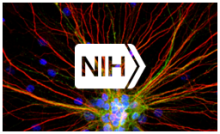
The Foundation for the National Institutes of Health (FNIH) has awarded the 2015 Lurie Prize in Biomedical Sciences to Karl Deisseroth of Stanford University. Dr. Deisseroth, a member of the BRAIN Working Group of the Advisory Committee to the NIH Director, is being honored for leading the development of optogenetics, a technology for using light to control the activity of neurons, as well as for CLARITY, a method for transforming intact organs into transparent polymer gels to allow high-resolution visualization of biological structures.
Over the past decade, optogenetics has become a ubiquitous tool in neuroscience labs worldwide and has played an important role in hundreds of research papers investigating the basic function of neurons as well as defects in neural circuitry underlying diseases such as Parkinson’s, depression, and schizophrenia. Developed two years ago, CLARITY has already enabled scientists to observe molecular-level details of healthy brains and the brains of Alzheimer’s disease and autism patients.
In alignment with the BRAIN Initiative’s goal of training scientists to use next-generation neuroscience tools and techniques, Dr. Deisseroth, using a research supplement from NINDS, offers free three-day workshops on both optogenetics and CLARITY throughout the year.
The Lurie Prize recognizes outstanding achievement by a promising scientist age 52 or younger, and includes a $100,000 honorarium. Dr. Deisseroth will be presented with the prize May 20 in Washington, D.C.
